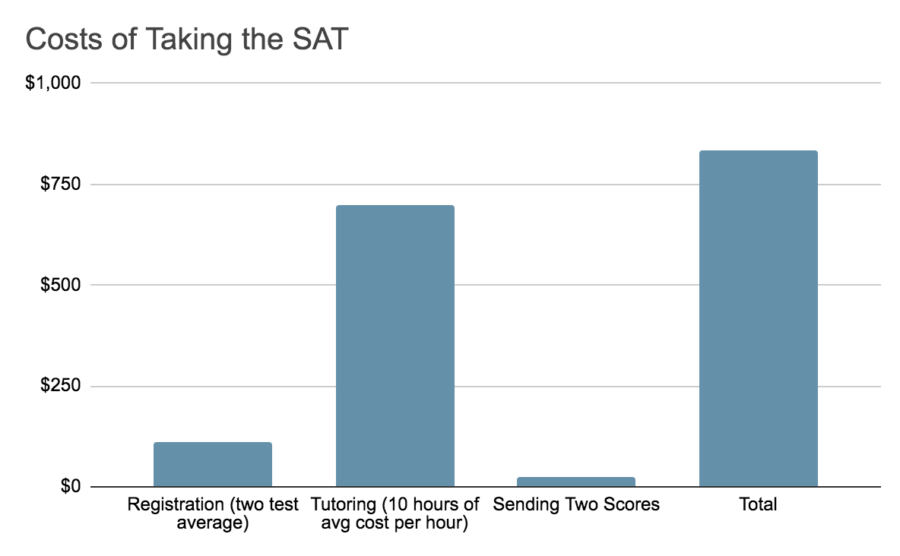Dethroning the College Board
The total cost of the SAT adds up to almost $840 for a single college applicant
Now that I’m a senior, I’ve had plenty of exposure to the College Board’s SAT and AP tests. I’ve studied for months, hoping to get the scores I want on both. For the SAT, it’s not a matter of intelligence but the importance of mastering the test and moving quickly through your thinking. Colleges are moving away from relying on standardized tests. Is this decision a good thing? How does this affect the college admissions process? Not only this, but do AP tests truly offer an advantage in academics?
Getting ready for the SAT takes multiple steps. First, students register for whichever test administration they want, and they pay $55 for each test. Students usually register for two tests in case the first one doesn’t quite reach their goals. Then, if they have the means to do so, they hire a tutor, averaging at $70 an hour. After getting your scores, plan to add another $12 to send them to the colleges you want. Students spend so much money on mastering the SAT, even though it doesn’t measure their ability to succeed in college. Yet colleges relied on these tests for so long and only now are realizing that it favors the more wealthy students that can afford tutors. The more money students are able to put into preparing for the test, the more successful they can be, which puts some students of lower economic status at a disadvantage in college admissions. According to the Washington Post’s chart of income and SAT score distribution in 2015, the $0-20,000 range scored an average of 1326, while families earning more than $200,000 a year scored 1714. This large margin between scores clearly shows how the SAT is putting families with lower income at a disadvantage and setting them up to face more challenges to get into college.
The college admissions process is changing, and many schools are adjusting to becoming test blind or test-optional. Test optional is what it sounds like: you can include your standardized test results, and they will have it in their consideration. On the other hand, test blind means the colleges won’t consider your score in your application. In both cases, if you don’t include your test results in your application, your application relies on your GPA, AP test scores, extracurriculars, and essays. So instead of helping the College Board grow financially, students now get to relax a bit of having to master a negligible test. Hopefully, the College Board will have less control over students’ admissions.
College Board has been profiting off of students’ stress and colleges’ belief that the SAT and AP tests measure high schoolers’ potential in college. Because of their rigorous courses, AP students tend to be more stressed to do well in the class and stay on track with their assignments. The College Board feeds on this pressure by urging kids to take their AP tests, charging them $96 for each test, putting more demand on students to pass the exam. On the one hand, it’s nice to potentially get college credit if you score higher than a three on AP exams, but even if you pass, some prestigious colleges only accept fours or fives. Furthermore, the profit of the College Board is not worth the stress for high school students. According to The Uproar’s “Why Everyone Hates the College Board,” the College Board is registered as a non-profit organization, yet they make 840 million dollars a year. Finally, the College Board promotes the idea that they better students’ odds of getting accepted into schools. Yet, they are making an absurd amount of money, conning students into spending more on add-on features on the exams.
All things considered, why are we still giving the College Board large amounts of money when they don’t care about our success? The SAT has been around since 1926 and has raised its influence in college admissions ever since. The price of the College Board’s exams has been slowly increasing and profit off students’ pressure to do well, sending the message that they won’t succeed in life unless they spend thousands to get a good score. We should be happy that colleges are moving away from the SAT since the College Board is the one who’s adding stress to students and favoriting families with higher incomes.

Caitlin is a senior at Boulder High School and a new member of The Owl. By joining the newspaper, she hopes to use it as an outlet to share interesting stories, dive deeper into topics that interest her, and have a more thorough understanding of journalism. Not only does she like writing, but she plays both club and high school soccer. She started the sport when she was in 4th grade and has continued to love the game more each year. Unless she has soccer practice, she often goes to get boba tea with friends or the swings at North Boulder Park at night with them. Ever since she was young, she’s loved to bake cakes and cupcakes. Her favorite part of the process was decorating and making them...



Lucca Swain • Oct 6, 2021 at 2:15 pm
This article definitely helps to prove just how terrible College Board is, and I agree. There shouldn’t be a single business that has a near-complete monopoly on education, because when they do, they corrupt the whole system like College Board has done.
Calvin Boykoff • Oct 6, 2021 at 1:58 pm
Wow, this article blew my mind! Not only that more wealthy individuals are able to get higher test scores through tutors, but that the College Board is enlisted as a non-profit organization while making 840 million dollars every year! Sounds like a big deal that needs to addressed, perhaps governmentally.
Clara Thomas • Oct 6, 2021 at 1:57 pm
This is a great article! I agree, there is so much wrong with the Collegeboard and the monopoly they have over AP and SAT testing.